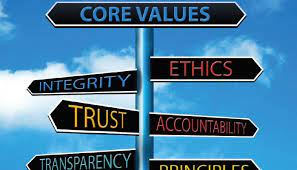Trust, accountability, and ethics are fundamental pillars of a healthy and successful workplace. They form the foundation upon which organizations build strong relationships with their employees, customers, and stakeholders. In the most recent episode of the podcast “Compliance into the Weeds,” Tom Fox and Matt Kelly discussed the importance of these factors in light of a wrongful termination lawsuit filed against Citibank by a former employee.
The importance of trust, accountability, and ethics in the workplace cannot be overstated. These elements are the bedrock of a healthy corporate culture and are crucial for maintaining a positive and productive work environment. I believe that a broader conversation about these topics is necessary within corporations, with a need for employees to understand the importance of trust, accountability, and adherence to policies and procedures. While there is great cynicism that exists among the public and the workforce regarding ethical enforcement particularly when banks which have paid literally billions of dollars in fines are involved, it is up to each employee to commit to doing the right thing, even when it is difficult.
As Matt noted in a Radical Compliance blog post, “Our tale, first reported by the Financial Times, involves one Szabolcs Fekete, who had been an analyst with Citibank’s London offices since 2015. In July 2022 Fekete had to take a three-day business trip to Amsterdam. He took along his romantic partner for the trip, and while there he billed a coffee and sandwich for his partner to his corporate expense account. Except, Fekete tried to cover it up by submitting a receipt for two sandwiches and two coffees, all for him.” He was subsequently fired for dishonesty on an expense report and lying to his supervisor and investigators when questioned about his submitted expenses. While the amount in question may seem trivial, (less than €100) the case highlights the potential consequences of dishonesty, even in seemingly minor matters.
One of the key takeaways from this case is the significance of trust in the workplace. Trust is the cornerstone of any successful organization. It is the belief that individuals can rely on each other to act with integrity, honesty, and transparency. When trust is compromised, it can have far-reaching implications for the overall culture and effectiveness of the organization.
The case also underscores the importance of accountability. Accountability means taking responsibility for one’s actions and being answerable for the outcomes. In this case, Fekete’s dishonesty led to a breach of trust, and he was held accountable for his actions. Organizations must have clear corporate values, policies, and training programs in place to prevent unethical behavior and promote accountability among employees.
Ethics, too, play a crucial role in the workplace. Ethics refers to the moral principles that guide individuals’ behavior and decision-making. It is about doing the right thing, even when it may be difficult or inconvenient. The case of Fekete highlights the need for employees to have a genuine commitment to ethical conduct, even in situations where it may be tempting to cut corners or bend the rules.
Balancing these factors can be challenging. On one hand, organizations must establish a culture of trust and accountability, where employees feel empowered to act ethically and take responsibility for their actions. On the other hand, organizations must also have systems in place to detect and address unethical behavior, ensuring that trust is not misplaced.
The episode also raises the question of the impact of these factors on decision-making. When faced with ethical dilemmas, individuals and organizations must consider the potential consequences of their actions. One thing we have learned from Enron going forward, if someone is willing to break ethical rules at a minor level, it raises concerns about their integrity and the potential for more significant breaches in the future.
Yet there is another, more troubling aspect to this matter that compliance and ethics professionals must consider. Pilita Clark, also writing in the FT noted, “Except the response to this story has been anything but straightforward. Most striking of all is the level of derision directed not at Fekete but at Citi. At the time of writing, more than 500 people had digitally applauded one FT reader who wrote in response to the story: “You can’t lie in a bank, unless it’s a really big lie.”
Clearly folks are still not happy that large financial institutions paid billions in fines without seemingly missing a beat. Clark went on to write, “Some of the largest costs related to the 2007-2008 financial crisis, but big sums arose in more recent years, including $402mn in 2018 to settle the bank’s role in a conspiracy to manipulate foreign exchange markets. Citi was among 20 large banks that collectively paid more than £377bn in such costs between 2008 and 2018, as a result of mis-selling, money-laundering, market abuse and other” misdemeanors.
In conclusion, the importance of trust, accountability, and ethics in the workplace cannot be overstated. These factors form the bedrock of a healthy and ethical organizational culture. The case discussed in the podcast episode serves as a reminder of the potential consequences of dishonesty and the need for clear corporate values, policies, and training programs. It also emphasizes the importance of individual responsibility in maintaining an ethical workplace. By prioritizing trust, accountability, and ethics, organizations can create an environment where employees feel empowered to act with integrity and make ethical decisions, ultimately leading to long-term success.



